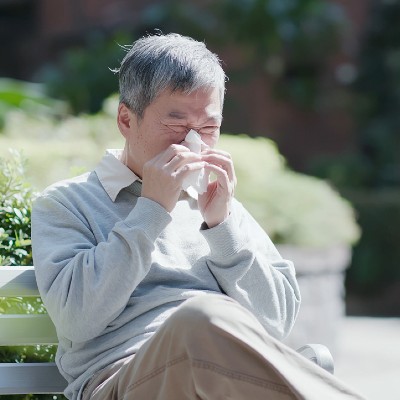How to Deal with Your Spring Allergies
Posted March 28, 2018 by Lynn Hamrich, MD

Warmer air, flowers blooming, sunshine! Most of us are happy to be headed into spring. But for some of us, this is the time of year we dread the most - spring allergy season. Did you know spring allergies can actually begin as early as February, depending on your location and the duration of your winter season? And, they can last until the middle of summer!
Common Causes of Allergies
First, let’s talk about the most common cause of allergies: pollen. It’s an allergen, which means it can cause an allergic reaction in people sensitive to it. It’s technically harmless to humans who are not hypersensitive. But for those who are, their immune system speeds into overdrive to produce antibody cells to fight this invader. The overproduction of these antibodies can activate other cells and this chain reaction can result in histamine production. That is what creates the common symptoms associated with spring allergies: itchy eyes, congestion and sneezing.
Fun fact: pollen can travel for miles. Well, that’s actually a not-so-fun fact!
Monitor Your Daily Activities
Second, some of your daily activities can help or hinder your allergy management. A few tips:
- Monitor pollen counts and mold levels in your area. Keep windows closed and minimize your outdoor exposure on high count days.
- Consider a no-shoes-inside policy during peak time. That will limit the amount of pollen tracked inside.
- Shower after prolonged outdoor exposure on high-count days.
- Avoid outdoor activity on windy days, that’s prime seasonal allergy time. A few other spring-related allergens can include: chlorine in pools, smoke from campfires and overusing your humidifier (dust mites LOVE humidity). Some allergies can be treated with over-the-counter medication but more severe reactions do require a visit to your primary care physician (PCP).
Additionally, as with most conditions, prevention is best. Don’t wait until your symptoms are severe. Staring therapy just before or at the very beginning of the allergy season may help prevent the most severe symptoms from developing.
Questions to Ask Your PCP
If you suffer from seasonal allergies and drug store meds don’t cut it, here are a few questions to address with your PCP:
- How can I tell if it’s allergies or if I have a head cold?
Most colds last 7-10 days. If you have symptoms that last longer than that, and seasonal allergies can last for months, you mostly likely don’t have a cold. With allergies, your runny, watery nose causes a clear, watery mucus, not so with a cold.
- I didn’t have allergies as a kid, why do I have them now?
You can actually “grow out of or into” an allergy. But, if you grow into one as an adult, you can count on it staying with you. Allergies can also appear if you live in a different climate than where you grew up, something you should mention to your PCP.
- Do I have to take allergy medicine all the time?
Medications like Zyrtec and Allegra usually last 24-hours. If you take those medications right when you wake up, you should be able to make one dose last through the night. But, with others, you may actually wake up to allergy symptoms. If your PCP prescribes allergy medication, always take the medication as directed. You will most likely have to take allergy medication for the duration of your specific allergy season. If you know you suffer from spring allergies, consider beginning treatment before your first symptoms appear.
- My allergies are pretty intense, so what’s an allergy shot and should I get one?
An allergy shot, also known as allergen immunotherapy, is actually a long-term form of treatment. It will require multiple physician visits for a duration of time. Some PCP’s perform this therapy, some do not and a referral to an allergy specialist may be necessary. This treatment is reserved for the most severe allergies that do not respond to appropriate therapy. There are two phases to allergen immunotherapy: the buildup phase and the maintenance phase. Initially, you’ll receive a shot once or twice a week for up to six months. Once the effective dose is reached, meaning your allergies are under control, you’ll begin to lengthen the time between shots to establish your maintenance phase. If you have severe, seasonal allergies that begin every year and last for months, you may benefit from immunotherapy.
If you or your family need a primary care or specialty physician, call 800.237.8662 for an appointment.
About the Author
Vitality eNews Sign Up
Receive the Summa Health eNewsletter for the latest health tips, advice and updates.


